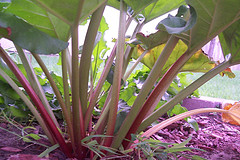Rhubarb
| Infobox on Rhubarb | |
|---|---|
| Example of Rhubarb |  |
| Freshness facts | |
| Optimum carrying temperature | 0°C to 1°C |
| Highest freezing point | -0,9°C |
| Acceptable product temp. at loading into containers | Max. 2°C above carrying temperature |
| Optimum humidity | 95% to 100% |
| Ventilation setting for containers | 10 m³/hr |
| Storage life | 2-4 weeks |
| Climacteric / non-climacteric | Non-climacteric |
| Ethylene production | Very low |
| Ethylene sensitivity | Low |
| Modified / controlled atmosphere | - |
| Potential benefits | - |
| Availability | |
| On demand | |
Rhubarb
Contents
Harvesting and Handling
Only the stalks of rhubarb are consumed ; the leaf blades are poisonous. The leaf stalks (petiole) are green, pink or red, according to cultivar and method of production.
Post harvest handling practices are directed towards the prevention of wilting. It used to be customary to market rhubarb with leaf blades intact and with the stalks in water. Now, however, it is recommended that the leaf blades be removed, although it is preferable if a few mm of leaf remain so as to keep the stalk from splitting. Immediate marketing after harvesting is desirable, unless cooling facilities are available.
Petiole colour is associated with rhubarb quality. The order of preference is red, pink and green. Petioles should appear fresh with no signs of desiccation or decay whether presented for sale intact or cut into sections.
Petioles lacking small leaf lamina are subject to splitting when exposed to moisture. Over-mature petioles become pithy. Abrasion of petioles by sand or rough handling adversely affects appearance.
The topped bunches or loose stalks should be packed in crates, and the crates should be stacked to allow ample air circulation; otherwise, there is danger of heating and mould growth. As a means of minimising moisture loss, plastic film packaging may be used, in the form of perforated polyethylene liners for the crates or cartons.
Cooling and Storage
Rhubarb petioles should be pre-cooled to 0°C by hydro-cooling or forced-air cooling.
Fresh rhubarb stalks in good condition can be stored 2 to 4 weeks at 0°C and high relative humidity.
Controlled atmosphere considerations
CA storage has not yet been used for rhubarb.
Storage disorders
Anthracnose, Bacterial soft rot, Grey mould rot.











